Table of Contents
Avocado carbs may raise eyebrows on a low-carb diet, but this beloved superfood can still be a healthy choice.
In this post, we’ll delve into the details of avocado carbs and show you how to incorporate them into your low-carb lifestyle.
From the different types of carbs in avocados to tasty and nutritious recipe ideas, we’ve got you covered.
Get ready to learn the many benefits of avocado carbs and how to make them work for you!
Avocados overview:
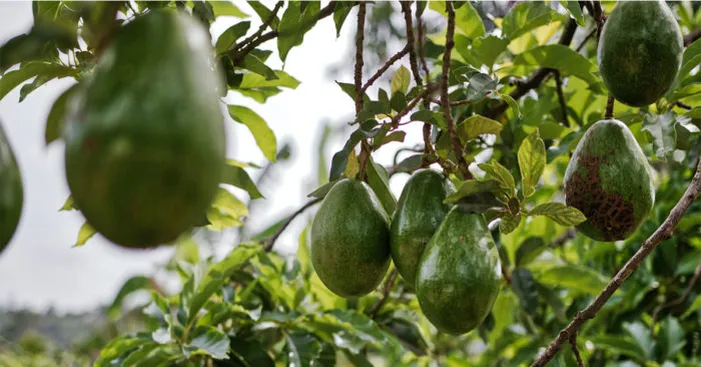
The avocado tree belongs to the Lauraceae family which mostly grows in tropical regions in Asia and Central America. (1)
It’s because the plant needs warm and moist weather conditions those of the Mediterranean and tropical regions.
In fact, farms know how difficult is to grow avocados as they require warmth with no frost or even little wind.
Also, every part of this plant including the roots, stems, leaves, flowers, seeds are vulnerable to diseases.
However, with modern sophisticated agriculture it is possible to grow and produce large quantities of this fruit.
An avocado matures on the tree but only ripens once it is picked. (2)
When ripe, the fruit is tender when you squeeze in your hand and its skin becomes dark green.
Avocado carbs:
Avocado carbs & nutritional values:
1 average avocado contains nearly 20 vitamins, minerals, and other nutrients:
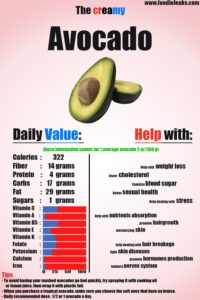
- Calories: 322
- Total Fat: 29 grams
- Carbohydrates: 17 grams
- Dietary Fiber: 14 grams
- Sugars: 1 gram
- Protein: 4 grams
- C vitamin: 34%
- A vitamin: 5.9%
- B5 vitamin: 35%
- E vitamin: 18%
- K vitamin: 29%
- Folate: 31%
- Potassium: 21%
- Calcium: 2.4%
- Iron: 6%
- Cholesterol: 0%
- Sodium: 1.3%
Avocado carbs benefits:
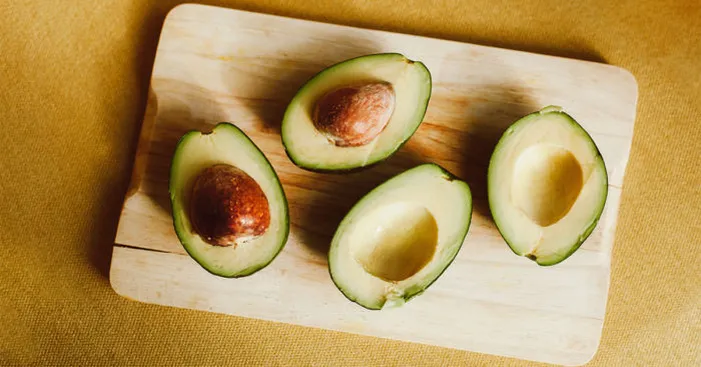
The avocado is full of virtues in terms of nutrition, health, and aesthetics!
This fruit has become known globally and you can find it almost anywhere you go.
People use avocados in different recipes including salads or even chocolate desserts.
Whatever the avocado recipe you choose, its benefits are undeniable! Here’s an overview…
Help losing weight:
To anyone interested in eating healthier, avocados are an excellent choice to add to your diet.
Even though they are a bit high in calories, they have been known to reduce the feeling of being hungry!
You might have heard that they have “good fats” inside of them… well it’s true!
The good fat inside avocados is known as monounsaturated fat, which helps to lower bad cholesterol in your body. (3)
The monounsaturated fat is what gives us that feeling of being full and lowers the body’s cravings, in turn, helping you maintain a healthy eating style.
Better cholesterol:
Avocados have a bad reputation for being loaded with calories and fats.
Half of an avocado contains 150 calories and 10 g of fats.
One thing that people don’t notice is that the fat in this fruit is unsaturated!
This type of fat, when taken with precautions, is an excellent source of good cholesterol HDL and has the ability to lower the level of bad cholesterol LDL. (4)
This would help to have a better blood flow and minimize the risk of blood clusters formation and then reduces the risks of heart diseases.
Stabilizes blood sugar:
Rich in nutrients, creamy, and full of good fats (unsaturated), avocado slows the digestion process.
These fruits have the ability to help your body lower the level of glycemia after eating a meal. (5)
Try to replace butter, margarine, or mayonnaise with creamy mashed avocados.
To avoid having your mashed avocados go bad quickly, try spraying it with cooking oil or lemon juice, and wrap it with plastic foil.
Better sexual health:
Widely known as the fertility fruit, avocados promote sexual hormone production, they stimulate the production of sperm and ovaries.
They also help to have a more balanced reproductive system.
This fruit’s nutrients participates in fighting hormone disorder and chronic fertility issues. (6)
Growing older, both men and women experience low levels of sexual hormones often called “Menopause”.
This can lead to weak erections and eventually a lower sex drive.
Avocado contains omega-3, potassium, and Vitamin B.
These nutrients promote a better blood flow, a healthier heart, and promote hormone production.
Eating more avocados will definitely make you more eager to go to the bedroom!
Helps dealing with stress:
Thanks to the benefits this fruit provides, specifically its folic acid content, it promotes the neurons and neurotransmitters’ activity.
With a more active nerve system, you’ll have better resistance when facing stress, depression, emotional fatigue, and anxiety. (7)
Helps with nutrients absorption:
Just like olive oil, avocado promotes the absorption of antioxidants contained in other types of daily food you eat.
For example, avocados multiply the absorption of lycopene from tomatoes 4 times more, this nutrient has anti-cancerous virtues. (8)
As for carrots, peppers, and spinach, avocado doubles the absorption of beta-carotene.
Avocado benefits on skin:
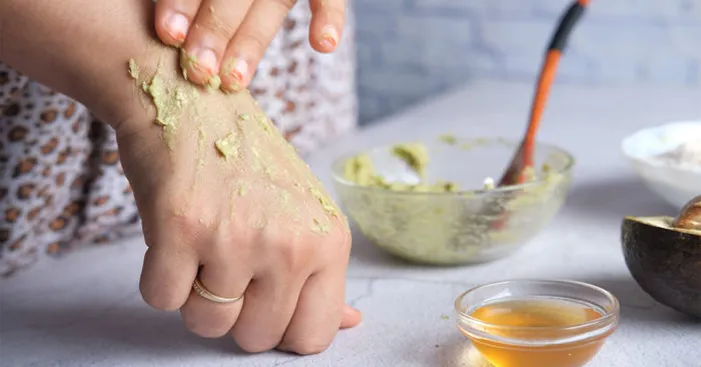
Holy Grail? More like Holy Avocado!
Avocados have been around for quite some time, but these past few years they have been growing exponentially in popularity.
With how versatile the avocado is in our everyday lives, it’s not surprising to me why it’s considered a favorite to many people.
If you’re constantly finding yourself buying lotions to moisturize and make your skin feel/look more youthful, then stop right there!
Not only are avocados amazing to eat, but they are also amazing at nourishing your skin.
They are filled with vitamins B, C, and E (to name a few) which help reduce wrinkles and inflammation and they have been known to heal acne as well.
The antioxidants inside avocados can help replenish your skin back to feeling smooth and hydrated; so no more countless searches for the perfect skin cream.
These incredibly nutritious foods which have anti-aging properties (along with many other benefits) are sweet to eat but are so much fun to use as a face mask.
Clearly, avocados are the “holy grail” of fruits!
Avocados, a Natural Remedy for Troubled Skin
There are so many varieties of creams on the market that are used for treating the skin, and in today’s world, we can never be sure these products will have the right effect on our skin.
If you have any sort of inflammation on your skin, avocado oil might just be the hero you’ve been looking for.
People who have specific skin problems like atopic dermatitis or eczema are aiming to decrease inflammation as well as hydrate the skin.
Those are two things that avocado oil can certainly help with! (9)
Obviously, with such conditions as those, you should make sure to carefully explore all of the side effects before applying anything to your skin.
Here are 3 homemade skin-care remedies made with avocados for different skin problems:
- For moisturizing, mix mashed avocados with 1 tablespoon of honey, blend them together until you get a thick green mixture.
Apply the mixture on your face and leave it for 20 minutes then rinse it with warm water.
You’ll notice immediately that your skin is softer. - For a day by day fighting dry skin, blend mashed avocados with 2 tablespoons of olive oil, use the mixture as a face mask for 15 minutes then rinse it with warm water.
This will nurture your face. - For uneven skin and acne: mix mashed avocados with 5 tablespoons of lemon juice, blend them and use the remedy on your face and leave it for 15 minutes.
Rinse your face with warm water, this face mask will help fight troubled skin.
Avocado benefits on hair:

Whether you have damaged your hair or simply your hair lost its tone, avocado oil will undo all of that and help your hair have its natural healthy state. (10)
Even if you’re not a fan of hair straightening, you probably had no choice but to air-drying your hair, especially during winter.
Even the summer sun can damage your hair through time and it won’t have that natural sparkle that once used to have.
To gain that back, you must support your hair with nutrients more frequently.
One famous remedy you can use to nurture your hair is, avocado!
It doesn’t only help smoothen your hair, but also plays a crucial role in rebuilding damaged hair.
You can easily make a homemade hair-mask, we all know that home remedies are much more guaranteed than commercial ones.
To do this:
- Blend avocados with a tablespoon of olive oil, a tablespoon of honey, and a tablespoon of yogurt.
- Apply the mixture to your hair starting from the roots down to the ends.
- Leave it for a good half-hour then wash your hair.
- The avocado nutrients along with the number of nutrients found in olive oil, honey, and yogurt, will provide your hair with all the essential needs for healthier locks.
- For those with really damaged hair, you can use avocado oil by applying it to your hair.
- Then wrap your oiled hair with a warm towel and leave it for an hour then wash it.
- This hair bath will be really beneficial to fight hair breakage and dry ends.
Whether you applied an avocado-based hair-mask or hair-bath, it will protect your hair from external conditions, moisturize it and promote its growth while making sure it’s smooth and sparkly.
Avocado is therefore recommended for the prevention of hair loss, dandruff, frizz, and dryness.
Consuming avocado carbs:
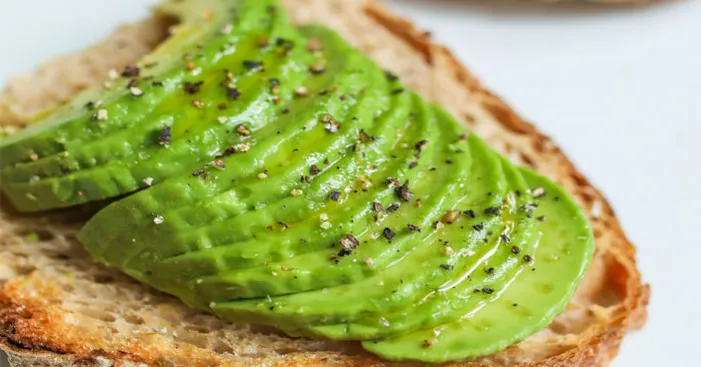
First, let’s focus on the basic uses of this fruit in the kitchen which only applies to ripe avocados.
Because of that, you may need to accelerate the ripening process by placing them in a paper bag as that speed up the process.
Also, you can take the unripe avocados out of the fridge and leave them at room temperature and they should ripe within 5 to 7 days.
Now you have your ripe avocados you can use them in many recipes, here are some delicious ideas for you:
With a little salt and lemon:
Avocados are a very delicate fruit and combines well with a pinch of salt and lemon.
Cut it in halves with its skin, sprinkle some lemon and salt on it and enjoy it as an afternoon refreshing snack.
Avocados in salads:
The best way to benefit from avocado carbs it to use them in salad recipes.
In fact, avocados also goes well in salads and this is the main use of this fruit.
They have a melting consistency and a delicate taste that adapt to any type of salad.
Especially for vegans, combine chopped carrots, onions and tomatoes with avocado to give that sweet gentle flavor to the salad.
Also, avocados are perfect with seafood salads and can be used with shrimp, salmon and tuna.
Guacamole:
There is nothing new to learn about the classical guacamole recipe.
You don’t need many ingredients to make your own at home and it’s excellent for a healthy diet.
The main ingredient in guacamole is avocados, then we add chopped onion, tomato and cilantro.
The next step is to add lime juice, salt and chili pepper if you want to add some spiciness.
After that, you can use a yogurt to add more consistency to the mix, stir everything together and there you have it!
Avocado soup:
The consistency of avocados makes it possible to use them for many soup recipes.
For instance, avocados, boiled carrots, vegetable broth, coriander, olive oil and lemon juice are enough to make a simple coriander soup.
In other parts of the world, people make avocado soups with spices.
Sandwich with avocado:
Vegans usually look for alternatives to make their sandwiches moist and less dry.
Thankfully, there are many alternatives that vegans can use including avocados.
As for meat eaters, avocado is often used in meat and fish sandwiches to add to the flavor and consistency.
Cooking with avocado instead of butter:
Mostly in tropical regions, people cook their sauces and stews using avocado instead of butter.
In addition, we can use avocado in cakes as a replacement for butter which makes it lighter and healthier.
Avocados in fruit cocktails:
Avocados doesn’t contain any fibrous material and that gives it a melting consistency perfect for smoothies and cocktails.
You can also try it with other fruit juices like the Carribean smoothie, mango juice or with fennel to smoothen digestion.
Stuffed avocados with tuna:
Sometimes we end up with tough avocados, why not use them to your advantage and make stuffed avocados?
Basically, you can use tough avocados just like zucchini by emptying their inside with a spoon and then filling it.
There is a long list of options you can use to fill avocados as you can use vegetables or fish fillings or even boiled rice and herbs.
One of the most delicious fillings of this fruit is with tuna or salmon and spices and lemon juice, a simple easy to prepare appetizer.
Precautions before you consume avocado carbs:
Generally, it is completely safe to eat avocado as long as you consume them moderately.
However in case of over consumption or allergy, avocados may cause side effects and may cause:
An Interaction with medicines:
Avocado offers a good amount of vitamin K, which is essential for blood clotting.
Even though that is safe and healthy, eating avocado for those who suffer from clots in their blood may complicate the clots.
Furthermore, the vitamin K in avocado would counter the effect of blood thinners such as warfarin and heparin. (11)
An increase in weight:
Avocados are high in calories and in unsaturated fats with an average fruit offering more than 300 calories.
This shouldn’t be a problem unless you go overboard and consume more than one avocado on a daily basis.
Skin irritation:
The side effects of avocado are sometimes the result of its sub-products.
For example, avocado oil may cause skin irritation for a certain group of people.
Avocado allergy:
Avocado allergy is actually a thing!
Especially people with latex allergy are 10 times more likely to have avocado allergy.
The sensory reaction that may occur from the intake of avocado is mostly due to the protein content.
In fact, avocado protein is similar to that if latex which is why the body reacts in the same way when encountering latex.
An allergic reaction to avocado may cause mild to acute respiratory symptoms: (12)
- Itching.
- Swollen lips.
- Redness of the skin.
- Sneezing.
- Vomitting.
- Coughing.
- Difficulty breathing.
- Anaphylaxis reaction.
In addition, children or infants with a sensitive stomach may have intestinal issues when they consume avocados.
Specifically, kids with allergies to rice, oats or milk may vomit and have diarrhea when they consume avocado.
Avoiding avocado side effects:
When you deal with avocado oil, apply it on a small area of the skin to avoid skin irritation in case of allergy.
Make sure you eat no more than 1 avocado a day in case you already deal with intestinal issues or want to maintain weight.
In case you are taking blood thinners, consult your doctor to inspect the safe amount of avocado you can take.
Completely avoid consuming avocado in case you have allergy to this fruits.
Buying avocados:
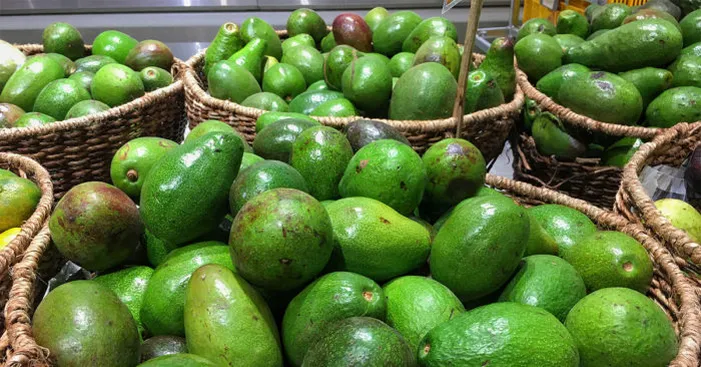
It is not pleasant to open an avocado only to find it’s not ripe or rotten.
There are two tips to assist you in choosing the best avocados in the market:
Removing the stalk:
This is the best way to choose good avocados, by removing the stalk (the part that connects the fruit to the branch).
Once you remove the stalk, you will get a glimpse of the inside.
Specifically you will see the color of the inside of the avocado:
- Light green: may be under-ripe but as long as the fruit is soft, you can buy it.
- Black: this is the color of rotten avocados and you should through it away.
- Green: perfect color and means that the avocado is perfectly ripe.
Applying gentle pressure with your hand:
If for some reason you don’t want to remove the stalk, you can apply a gentle pressure on the base of the fruit.
This technique is less reliable than removing the stalk, but most of the time it also works.
Depending on the state of softness of the fruit, an avocado could be:
- Soft and not too mushy, best state and you’re good to go.
- Very soft and mushy, the avocado is most likely overripe or even rotten.
- Hard, the fruit is under-ripe but you can still buy it and ripe it at home.
Storing avocados:
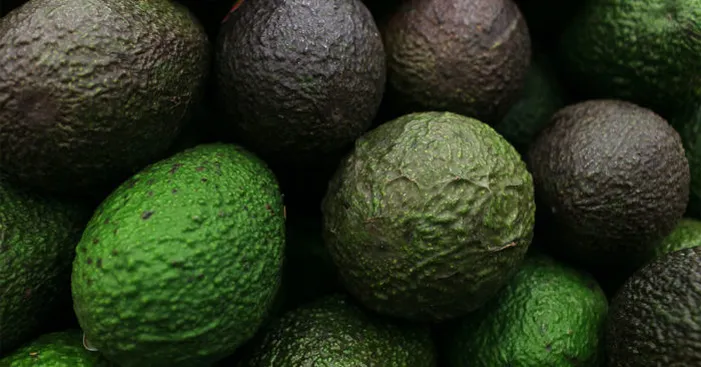
Contrary to what we know, avocados are fruits not vegetables.
Also, These fruits start ripening after being harvested and sometimes we end up with unripe fruits at home.
Because of that, you should know few tips on how to ripen and store your avocados.
Ripening an avocado while preserving it:
To ripen and conserve an under-ripe avocado, simply wrap it in a newspaper and leave it at a room temperature for 3-5 days.
In case you want it to ripe faster, place the avocado with bananas or apples in a sealed paper bag or newspaper.
It’s because apples and bananas produce ethylene while ripening which help accelerate the ripening of the avocado.
Storing avocado in the fridge:
In case you cut an avocado in half, but it’s under-ripe.
First start by coating the inside of avocado with lemon juice to prevent the avocado from turning black.
Then, put the two halves back together while still having the seed and lemon coating on.
Finally, wrap the avocado with a plastic foil and place it in the fridge and consume it 4 days later when it’s ripe.
Storing avocado in the fridge:
In case you want to preserve your avocado for months, you can freeze them!
Start by cutting the avocados in halves lengthwise and remove the seed.
Then, using a spoon, remove the flesh of the fruit.
Sprinkle the avocado insides with lemon juice and mash it (or blend it) with a fork until it becomes smooth.
Put the avocado puree in a well-sealed air tight container and freeze it for 6 months.
When it’s time to consume your frozen avocado puree, take them out of the freezer and let them defrost for 4 hours in the fridge.
If the puree is no longer green in color, it is spoiled and you should throw it away.
References:
(1): Laurel Family (Lauraceae) | Encyclopedia.com
(2): Is that avocado ready for harvest? Here’s what to look for in your garden | Home/Garden | nola.com
(3): Effects of avocado as a source of monounsaturated fatty acids on plasma lipid levels – PubMed (nih.gov)
(4): Avocado Consumption and Risk Factors of Heart Disease: a Systematic Review and Meta‐analysis – Mahmassani – 2017 – The FASEB Journal – Wiley Online Library
(5): Effect of a high-monounsaturated fat diet enriched with avocado in NIDDM patients – PubMed (nih.gov)
(6): Foods You Should Be Eating To Improve Fertility | Fertility North
(7): The association of folate and depression: A meta-analysis – ScienceDirect
(8): Carotenoid absorption from salad and salsa by humans is enhanced by the addition of avocado or avocado oil – PubMed (nih.gov)
(9): Polyhydroxylated fatty alcohols derived from avocado suppress inflammatory response and provide non-sunscreen protection against UV-induced damage in skin cells – PubMed (nih.gov)
(10): Hair Cosmetics: An Overview (nih.gov)
(11): Warfarin Dietary Tips | Thrombosis & Clotting Treatment (ihtc.org)
(12): Family Allergy Asthma & Sinus Care – Holy Guacamole! I have avocado allergy! (allergyforall.com)

